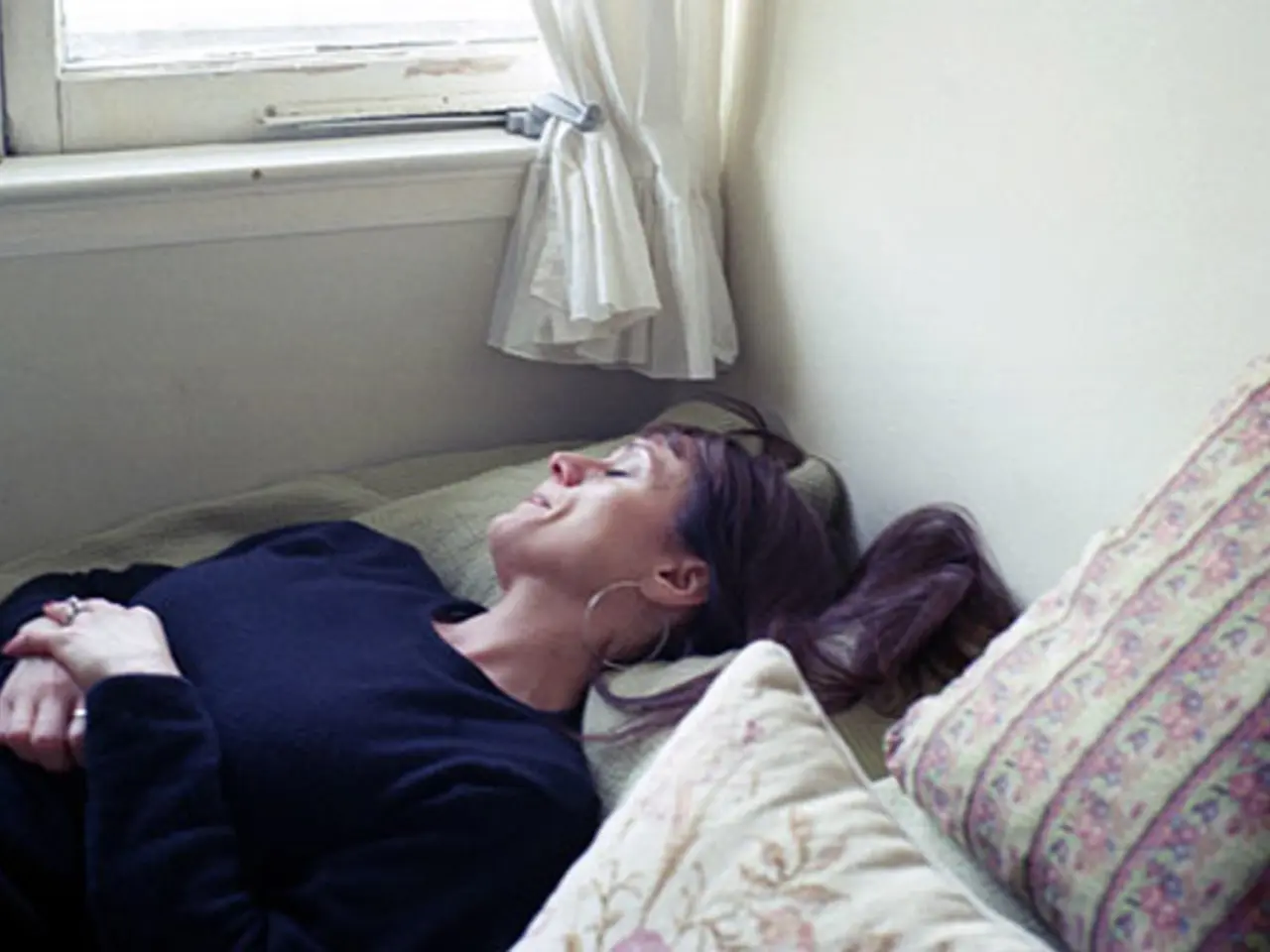Causes of Sleeplessness in Women
In a world where sleep is a precious commodity, a significant number of women struggle more than men to get the rest they need. A series of hormonal fluctuations and lifestyle factors contribute to this trend.
Sleep issues during different stages of a woman's life are heavily influenced by the two main female sex hormones, estrogen and progesterone. These hormones play a crucial role in the brain regions that regulate sleep, affecting sleep quality and patterns [1].
During the menstrual cycle, the premenstrual phase marked by falling estrogen and progesterone levels can lead to more frequent awakenings and difficulty returning to sleep [2][3]. Similarly, during perimenopause and menopause, declining estrogen levels disrupt sleep by affecting temperature regulation, causing night sweats and hot flashes that interfere with sleep, and increasing insomnia rates significantly in midlife and older women [2][5].
Premenstrual syndrome (PMS) and premenstrual dysphoric disorder (PMDD) are also associated with decreased sensitivity to melatonin and reduced deep sleep, exacerbating insomnia symptoms [3].
Early evening rises in melatonin in women make them biologically inclined to sleep earlier, but also more sensitive to sleep disruptions due to circadian rhythm differences [1][4].
Lifestyle and psychosocial factors also play a significant role in higher insomnia rates in women. Women are more vulnerable to stress, anxiety, and depression, which commonly co-occur with insomnia. Women also engage more in worry and rumination, known to impair sleep [2][3].
Social and caregiving roles disproportionately borne by women add emotional and physical stress, which can disrupt sleep patterns [2]. Other health conditions prevalent in women, such as thyroid disorders and iron deficiency, also negatively impact sleep quality [2].
Women are prescribed antidepressants more often, many of which have side effects that impair sleep [2].
Pregnancy, a time of substantial energy demand for a growing fetus, is a challenging time for quality sleep. Lack of sleep is normal after the baby arrives due to around-the-clock caregiving, but sleep problems can last longer than expected for many new parents and caregivers.
Developing healthy sleep habits can help some women, but those with chronic insomnia for more than three months should consider consulting a healthcare professional. Cognitive behavioral therapy for insomnia (CBT-I) is a recommended first-line treatment for insomnia, involving exploring thoughts, feelings, and behaviors that contribute to insomnia symptoms and providing healthy strategies to relax and establish good sleep habits [6].
Hormone replacement therapy during menopause may improve sleep quality for some women, but not for others [7]. Hot flashes during menopause can cause sleep problems for some women, but these tend to improve over time [7].
In summary, the interaction of cyclical hormonal changes unique to female biology with psychological stressors and social demands leads to higher frequency and severity of insomnia in women than men [1][2][3][5]. Understanding these factors can help women take steps to improve their sleep health and overall well-being.
References:
- Irwin, M. R., & Carney, R. M. (2019). Sex differences in sleep and sleep disorders. Nature Reviews Neuroscience, 20(8), 487-499.
- Ohayon, M. M. (2002). Sex differences in sleep disorders: A review of epidemiological studies. Sleep Medicine Reviews, 6(3), 173-187.
- Ohayon, M. M., & Caulet, C. (2010). The role of hormones in sleep disorders: A review of the literature. Sleep Medicine Reviews, 14(4), 263-274.
- Czeisler, C. A., & Gooley, J. J. (2019). How melatonin regulates the circadian clock. Nature Reviews Neuroscience, 20(8), 500-510.
- Shifren, J. L., & Bassuk, S. (2018). Sleep disorders in women: A review. Journal of Women's Health, 27(11), e124-e132.
- Morin, C. M. (2006). Cognitive-behavioral therapy for insomnia: A comprehensive review and update. Behavior Therapy, 37(4), 549-558.
- Kang, S. W., & Lee, J. Y. (2015). Effects of hormone replacement therapy on sleep quality in postmenopausal women: A systematic review and meta-analysis. Journal of Clinical Sleep Medicine, 11(5), 593-600.
- Despite hormonal fluctuations and lifestyle factors, sleep quality is vital for both women and men.
- Science has linked decreased mental health, such as depression, to disrupted sleep patterns in women.
- In some cases, hormone replacement therapy during menopause can improve sleep quality for women, while in others, it may not.
- During menopause, declining estrogen levels and associated symptoms like night sweats can lead to sleep interruptions.
- Health-and-wellness professionals recommend cognitive behavioral therapy for insomnia (CBT-I) as a first-line treatment for chronic insomnia.
- Women, due to a higher vulnerability to stress and depression, are more prone to mental health issues associated with inadequate sleep.
- Menopause, pregnancy, and certain health conditions in women can significantly impact sleep quality and duration, which may require professional intervention.




